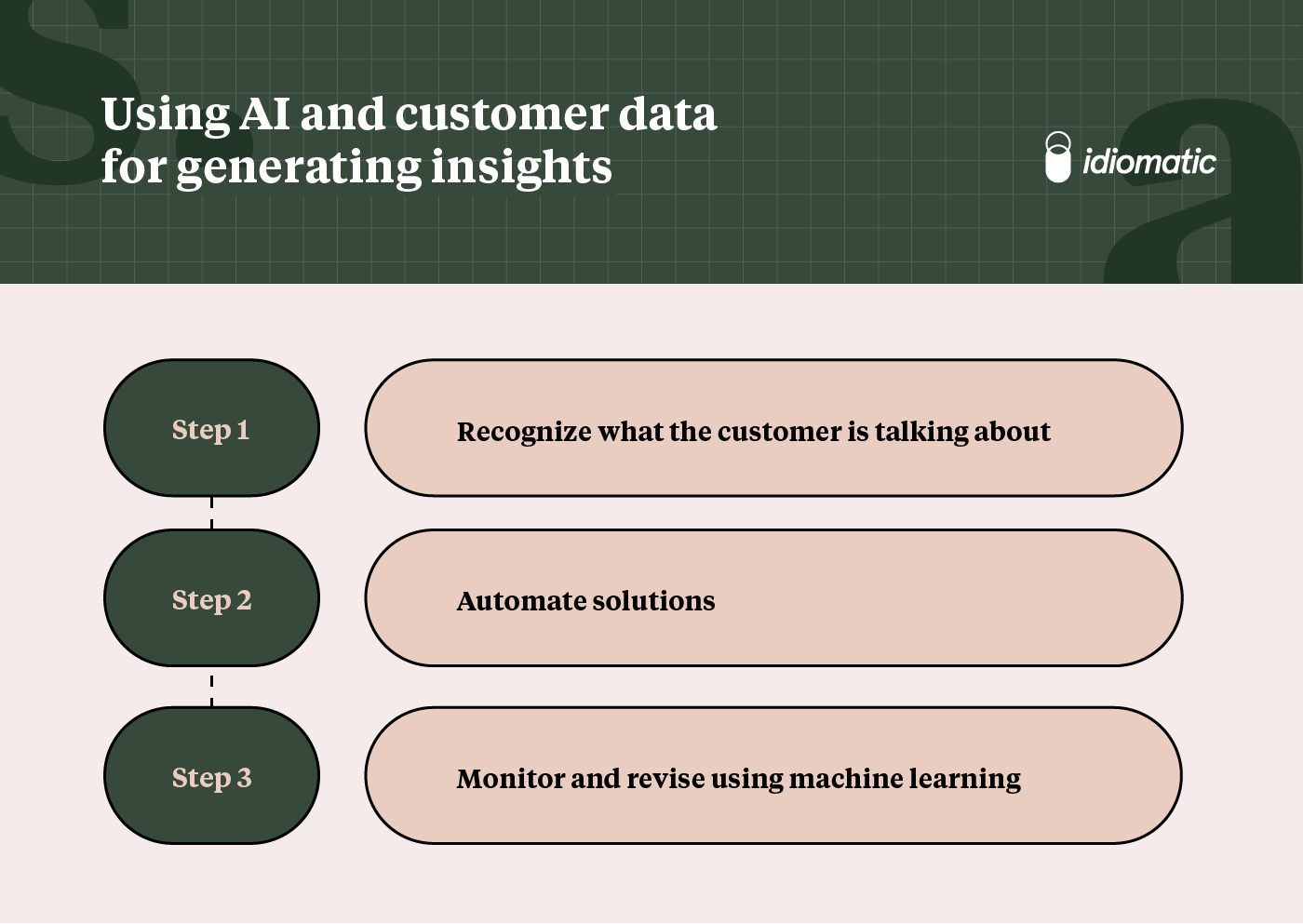As businesses grow, some need help dealing with the increase in customer support inquiries. The best way to ensure a scalable customer support team, no matter your business size or expansion plans, is to integrate artificial intelligence (AI) with your human customer support team.
Your organization can use artificial intelligence to support the work done by human staff through handling common customer complaints and queries with scripted workflows and processes. The ultimate goal is to resolve customer inquiries as quickly and accurately as possible without using human resources unless necessary (such as for unique queries or VIP clients).
Read on to learn how your organization can use AI in customer service.
Contents
- The use of AI in customer service
- Does AI replace a real customer service team?
- How does AI improve the customer experience?
- Business benefits of using AI in customer service
- How to use AI in your customer service processes
- Where to gather customer data for the AI
- Using AI and customer data for generating insights
- Is AI the future of customer service?
The use of AI in customer service
AI in customer service enhances your existing customer interactions by providing customers with faster, more personalized experiences. Common uses include natural language processing (NLP), self-service channels, and machine learning models to provide a seamless and efficient customer experience as well as analyze customer feedback.
Natural Language Processing (NLP)
Natural language processing is how computers understand human language in customer feedback, like instant messaging, emails, and help desk tickets. NLP enables AI to quickly analyze any written words (or spoken as in the case of recorded customer service phone calls) to understand the customer’s intent.
Self-service channels
Based on AI-derived data and insights (like commonly asked questions) you can create self-service channels to help your customers find their own answers (such as a knowledge base or video tutorial library) or to improve your automated AI chatbot logic and scripts.
Chatbots
Chatbots are helpful at addressing quick and common customer queries if they’re set up correctly. Chatbots come in various forms. Most use a combination of keyword identification and NLP to detect the customer’s problem and then provide them with either a scripted response or an automatically generated answer to their query.
Chatbots may receive a bad reputation amongst some customers,if they aren’t set up properly. For example,iIf their set up is too rigid, the customer will receive a message to “contact a customer support team member” to solve their query (which is likely something they’re trying to avoid doing). On the other hand, if they’re too relaxed, they might feed the customer with an answer that’s unrelated to their question, causing frustration.
To make chatbots efficient for your customers and your customer support teams, ensure they’re detailed and robust enough to handle the quick queries you get most often. You can use insights from machine learning to help improve your chatbot over time.
Machine learning models
Natural Language Processing is about interpreting the language, but machine learning models take inputs any actions that humans can perform and use them to “learn” and get smarter. With machine learning integrated with your customer service experience, you can analyze large amounts of data and look for meaningful trends and find insights faster and more efficiently than manual human analysis.
For example, you may have automation to route customer support tickets to team members or you may train machine learning models to tag each of your cases with a customer intent. Over time, your machine learning will get more efficient and accurate in routing tickets or running automations.
👉 Idiomatic helped Instacart save $445k in annual customer support costs by proactively addressing specific customer pain points and driving down contact volume. Read the full case study.
Does AI replace a real customer service team?
AI in customer service is not meant to replace real customer service agents but to enhance their ability to provide the best user experience for your customers. It can help address everyday customer struggles, so your customer service staff can focus their efforts on more complicated customer queries or VIP customers.
There should always be a human element in customer service, so ensure you still have ways for customers to contact human agents when they need it.
How does AI improve the customer experience?
When used properly, AI can unlock a new level for customer support teams. When integrated into your current systems and analytics, customers get the following benefits:
Faster query resolution and response time
Customers expect a company to solve their problems promptly. AI can help your team solve queries faster with features like automated ticket triaging or ticket routing to appropriate agents, instantly serving customers with knowledge articles based on their query, or monitoring spikes in ticket volumes so your team can act swiftly to mitigate customer issues.
Personalized user experiences
Use AI-powered customer service to provide more personalized user experiences. For example, AI can analyze customer behaviour on your website and determine which stage of the customer journey a user is in according to their actions. You can then serve the user with personalized messaging—whether that’s an offer for support, a product recommendation, or a helpful content piece.
24/7 support
With artificial intelligence supporting a big part of your customer service experience, you may not need to staff a help desk or call center 24 hours a day. You can service most customers through self-service portals and AI-powered automations at all hours of the day. This makes customers happy when they can resolve their problem at 2 a.m. instead of waiting for your customer service department to open at 8 a.m.
👉 Learn more about how to improve the customer experience in our complete guide to customer experience analytics.
Business benefits of using AI in customer service
When you improve customer service using AI, your customer service teams and business will also see significant benefits, including:
Lower customer service costs and optimized workflows
Salary costs are often a considerable portion of company budgets. You can optimize your staffing by using AI to support customer service automation and ensure queries are delivered to the correct internal staff member every time.
When your manual and automated workflows are optimized, your team can help more people and work more efficiently to provide consistent support when and where your customer needs it, even outside business hours. You can use insights from artificial intelligence to ensure existing workflows work as expected or help you create new ones to better meet your customers’ need for accurate solutions quickly.
Increased agent satisfaction
Happy and satisfied customer service staff are more likely to provide a better customer experience. For example, if a senior customer service rep deals with mostly monotonous “easy” tasks daily, they might become bored and feel that their expertise and skills are not best utilized. A newer staff member who gets all the VIP or complicated customer service interactions might feel overwhelmed and ill-equipped to deal with these queries.
With artificial intelligence and machine learning algorithms ensuring accurate ticket routing, each staff member is more likely to receive the tickets best suited to their expertise and experience. Alternatively, they can be trained in better responding to common customer scenarios based on data collected by the AI.
Improved buying process and increased sales
New customers expect a seamless process to purchase. At this point you’re still building brand reputation and trust with them. Any barriers to the buying or onboarding process (including technical bugs or customer uncertainty about the value of the purchase or your brand reputation) could make them abandon their purchase. The easier you make their buying journey, the more sales you’re likely to make.
Use AI to anticipate trends and the types of questions customers may have before they drop off. This helps you address or solve customer queries before the customer experiences the barrier. This may also include adding support contact links throughout the buying process. If problems arise, the customer can reach someone quickly for help or a resolution before they abandon their purchasing decision.
Predictive insights
With robust AI and machine learning algorithms, you can quickly analyze mountains of customer feedback data already gathered, allowing you to uncover customer issues, trends, and patterns. With this information, you can anticipate and address issues or requests faster and more accurately.
For example, AI-powered chatbots can predict which upsell offers a customer is likely to buy, based on their past behavior and that of customers with similar behavior and profiles. The chatbot responses can be personalized to lead the customer towards a more successful outcome.
How to use AI in your customer service processes
Here are some examples of how to use artificial intelligence to optimize your customer service solutions:
-
- Chatbots: Use AI-powered chatbots to respond to quick or straightforward customer queries. Use insights from your AI and machine learning algorithms to know what issues are best addressed and scripted for your chatbot.
- Automated email responses: Use your insights to write and automate email responses or use email routing to best meet your customer’s need for quicker, more accurate resolutions.
- Customer service training: Customer service training for new and existing staff can help your team better and more consistently answer customer questions. Use insights from your AI and analytics platforms to show your teams the typical customer behavior and complaints so you can teach them how to deliver appropriate and accurate solutions.
- Customer service role play: You can test the skills of your customer support staff by using AI to construct simulations and realistic conversations. Your agents can test different scenarios and responses to predict which are more likely to be successful and adopt these successful scripts and strategies across the support team.
Where to gather customer data for the AI
Your AI is only as intelligent as the data you provide to it. The more information you can input into your customer analysis systems, the more accurate and detailed the insights will be. It also helps to choose an AI that uses machine learning models that are designed to provide insights for customer support teams, like Idiomatic.
With Idiomatic, you can integrate various customer feedback data sources into the platform for it to analyze. It uses your data to help you reduce operational costs and optimize support operations by truly understanding the customer journey and pain points along the way related to your customer service.
👉 Idiomatic can analyze and quantify any type of customer feedback data. Learn more.
Using AI and customer data for generating insights
With insights from your AI, you can create more efficient and accurate workflows to increase customer satisfaction and expedite query resolution. Using artificial intelligence for insights includes three steps:

Step 1: Recognize what the customer is talking about
Using your customer interaction data, AI can determine what the customer is talking about, categorize each customer’s issue, what information they need to solve it, or who can best respond to the query.
For example, Idiomatic’s AI driven platform takes your customer feedback data (like surveys, support tickets, app reviews, and other user-supplied or collected data) and uses machine learning algorithms to do the data tagging and counting for you to uncover actionable next steps to make improvements to customer service processes. This frees your team to focus on using the insights to decide how to apply them business-wide.
While most AI platforms use high-level NLP and keywords, a platform like Idiomatic customizes the labels per channel and per customer. Idiomatic creates its own training data and then uses supervised machine learning to train custom models to label customer feedback more specifically. This will identify deeper issues and trends you may not have had the time or manpower to surface with manual analysis.
Using this contextual machine learning, you can get more specific, data-driven, actionable insights to make the customer’s experience even better. For example, your artificial intelligence can predict when to contact a customer with a relevant cross-sell opportunity using data from similar users.
Step 2: Automate solutions
Based on the insights gathered from your AI and machine learning algorithms, you can determine the best way to address this feedback. For example, the insights may indicate:
- Making a change to your product or offering, to “fix” a common problem or customer struggle.
- Creating a knowledge base article on a commonly asked question, for those who prefer solving their problem without contacting a human agent.
- Programming new chatbot conversations based on high-volume, low-complexity queries.
- Creating a new ticket routing system to ensure queries get to the correct department more efficiently.
Step 3: Monitor and revise using machine learning
After setting up your automations, have a machine learning and customer support platform like Idiomatic continually collect live data and analyze it. Through this analysis, Idiomatic provides most up-to-date valuable insights to optimize your automations and customer support processes
Is AI the future of customer service?
AI is the future for any business that wants to scale and grow while maintaining good customer service and query response times. It should enhance the existing experience with your human support agents and provide faster responses and resolution for common customer questions.
Using AI technology should include integrating all your digital data sources and customer information into one platform for more detailed customer and support query analysis. Idiomatic gathers your customer feedback data in one place, then analyzes this data using its comprehensive machine-learning algorithms. From this, it derives actionable insights to help you improve the customer service experience at your organization.
Request a free demo of Idiomatic today to learn how it can help you optimize your customer support processes using AI and machine learning algorithms.




